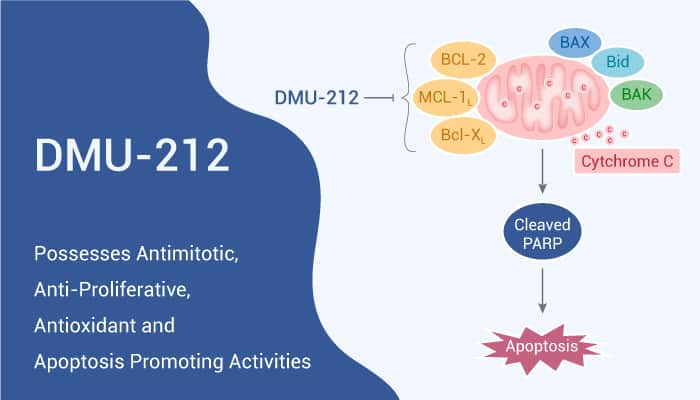Resveratrol is a naturally occurring phytoalexin that possesses a wide diversity of anticancer effects. Especially, Resveratrol inhibits multi-kinase enzyme activity and induces apoptosis. In particular, DMU-212 is a Resveratrol analogue containing methoxy groups in place of the hydroxyl groups of the stilbene moiety.

DMU-212 inhibits cellular proliferation of A375, MeWo, M5 and Bro human melanoma cells (IC50=0.5 μM for A375 and Bro and IC50=1.25 μM for MeWo and M5 cells). In particular, DMU‐212 is superior to Resveratrol (IC50=30 μM) in inhibiting cell growth of human melanoma cells. DMU‐212 causes a marked increase in the levels of p21, p53 and cyclin B1 proteins with a concomitant decrease in the levels of cyclin A2. In addition, DMU‐212 induces G2/M arrest and apoptosis in breast, liver, ovarian and colon cancer cell lines. Importantly, DMU‐212 exhibits desirable submicromolar/micromolar potency for melanoma cells as in the case of MCF7/HepG2/A2780 cells.
DMU-212 inhibits tumor growth in xenograft model of human ovarian cancer. Moreover, DMU-212 evokes a mitochondrial apoptotic pathway in transformed fibroblasts and breast cancer. In vitro, DMU-212 inhibits the growth of transformed fibroblasts, prostate, cervical, ovarian, breast, liver and colon cancer cell lines. Furthermore, DMU-212 exerts anti-proliferative effects through multiple mechanisms. The mechanisms include down-regulation of the expression of enzymes catalyzing carcinogens activation, induction of cell cycle arrest and initiation of apoptotic mechanisms. As a result, DMU-212 triggers a mitochondrial apoptotic pathway in transformed fibroblasts and breast cancer cells.
To summarise, DMU-212 acts as a potential anticancer agent used in human melanoma and ovarian cancer therapy.